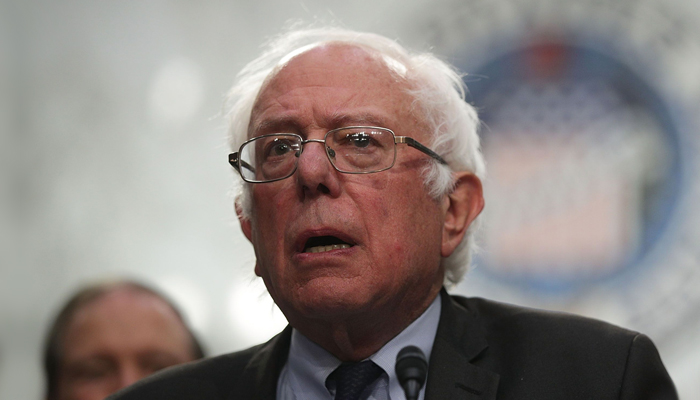Key Democrats line up behind Sanders health care bill
September 14, 2017

WASHINGTON: Former US presidential hopeful Bernie Sanders will Wednesday introduce a plan for government-sponsored universal health care, a notion long shunned in America that has newly gained traction among rising-star Democrats.
But while support for such a scheme has surged among prominent Democrats — including several who may launch presidential bids in 2020 — the party's leaders are not on board with the liberal independent senator.
Sanders, whose so-called "single payer" health insurance proposal was a key part of his run against Hillary Clinton for the White House nomination, said his bill has 15 co-sponsors plus himself — representing one third of the Senate Democratic caucus's 48 members.
A handful of others, including Joe Manchin and Chris Murphy, are openly considering it.
"The last time I introduced this bill, it lacked a single co-sponsor," Sanders said Wednesday in an email to supporters.
"This is a struggle whose time has come."
Six of the backers — senators Elizabeth Warren, Kamala Harris, Cory Booker, Kirsten Gillibrand, Al Franken and Sanders himself — are considered potential contenders in the race against Republican President Donald Trump three years from now.
"Health care should be a right, not a privilege," Gillibrand said in a statement announcing her support for Sanders's "Medicare for All" bill.
The legislation, which Sanders said would expand coverage to all uninsured people, simplify a complicated system for families and reduce administrative costs for businesses, has virtually no chance of passage with Trump's party running Washington.
Republicans control Congress, and on Wednesday they were unveiling their own bill in the Senate, one that would effectively turn control of the health care markets over to the 50 US states.
"Bernie, this ends your dream of a single-payer health care system for America," Republican Senator Lindsey Graham said as the bill was presented.
But the level of Democratic backing for Sanders' plan reflects his influence within the party's progressive wing.
Senator Tammy Baldwin's support is noteworthy. She once kept the Sanders proposal at arm's length, but has now embraced it one year before she stands for re-election in Wisconsin, a state Trump narrowly won in 2016.
Supporting the Sanders bill helps Democrats broadcast their progressive bona fides to the millions of voters who backed his White House bid.
Sanders' single-payer plan — in which the government directly shoulders medical costs for its citizens — would mark a fundamental shift away from the country's current system built largely around private insurance.
His plan would dramatically expand Medicare — the health insurance program for Americans age 65 and above, whose costs are largely covered by government — to create perhaps the most ambitious social welfare initiative in US history.
If the Democrats' 2020 presidential nominee ends up backing such a plan, it could frame a titanic clash with Trump, who campaigned heavily on his pledge to repeal and replace Barack Obama's signature health reforms that expanded coverage to millions of uninsured Americans.
In a sign of the shift within the party, a majority of House Democrats have now signed on to a single-payer bill that congressman John Conyers has been introducing regularly for years.
No 'litmus test'
Their enthusiasm is not shared by Democratic party leaders.
"I don't think it's a litmus test," top House Democrat Nancy Pelosi told The Washington Post.
Her immediate mission is "protecting" Obama's Affordable Care Act, which Republicans could again try to repeal this month, following several failed attempts in 2017.
Democrats have expended much political capital defending Obamacare, and leaders are unlikely to want to relitigate such a costly fight for a more progressive plan.
"What we want is to have as many people as possible, everybody, covered, and I think that's something that we all embrace," Pelosi said.
Senate Minority Leader Chuck Schumer has also been non-committal.
A crucial hurdle is money. Sanders has not explained how much his proposal would cost, but the tab is sure to be hefty.
"Nobody's figured out how you can afford it yet," House Republican Tom Cole told reporters.
"I think they're making the mistake of a lifetime," Cole said of Democrats. "But I think that's where their party's moving."
Some supporters of the bill acknowledge that passage is unlikely at this point in time, but hope it can serve as a marker in the US political landscape
"This bill is aspirational," Franken said in a statement. "I'm hopeful that it can serve as a starting point for where we need to go as a country."











